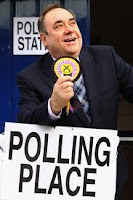The picture above was taken in January 2011. It’s of (most of) the unread books I owned then. I’ve read solidly since, but weirdly the shelves’ contents haven’t diminished. And now I have my Kindle too, which holds a further 20 or so novels as well as numerous short stories and ‘tasters’.
Every month I buy and immediately read the Berwick Book Group choice. Then I’m on my own, faced with the impossible task of deciding what book’s next. On some occasions I’ve resorted to closing my eyes and sticking a hand out blindly to grasp one. Other times I choose work by a particular author who may be new to me and I’m going to see him or her soon at a book festival.
So why on earth have I signed up to do the Eclectic Reader Challenge? To read a dozen books this year in 11 different genres?
About 98% of my TBR books are in my favourite reading genre: crime fiction. Which is also the genre I hope to be published in (so all that reading’s research, right?) However, when I read Pete Denton’s blog about the Eclectic Reader Challenge I couldn’t resist the idea of being forced out of my comfort zone, but in a structured way. So here are the genres I have to read in and the books I've chosen so far:
Genre | Title |
Literary | |
Crime/mystery | The Murder Wall (Mari Hannah) |
Romantic | |
Historical | |
YA | Deathwatch (Nicola Morgan) |
Fantasy | A Game of Thrones (George RR Martin) |
Science Fiction | Flow My Tears, the Policeman Said (Philip K Dick) |
Non-fiction | |
Horror | |
Thriller/suspense | |
Classic | Great Expectations (Dickens) |
My favourite genre |
I’m pretty sure I can rely on my book group to furnish me with a book that fits into the ‘literary fiction’ category later in the year. My other choices will be made arbitrarily, as I happen upon writers and books which sound interesting but in the past I would have been deterred from getting by my heaving TBR shelves.
So what if I still have 100+ books left unread this time next year? As my Mum says, ‘They don’t eat anything’.
Do you have trouble choosing the next book to read off your bookshelf? Or are you one of those really organised people who only buy books when they need them? I'd love to know!








